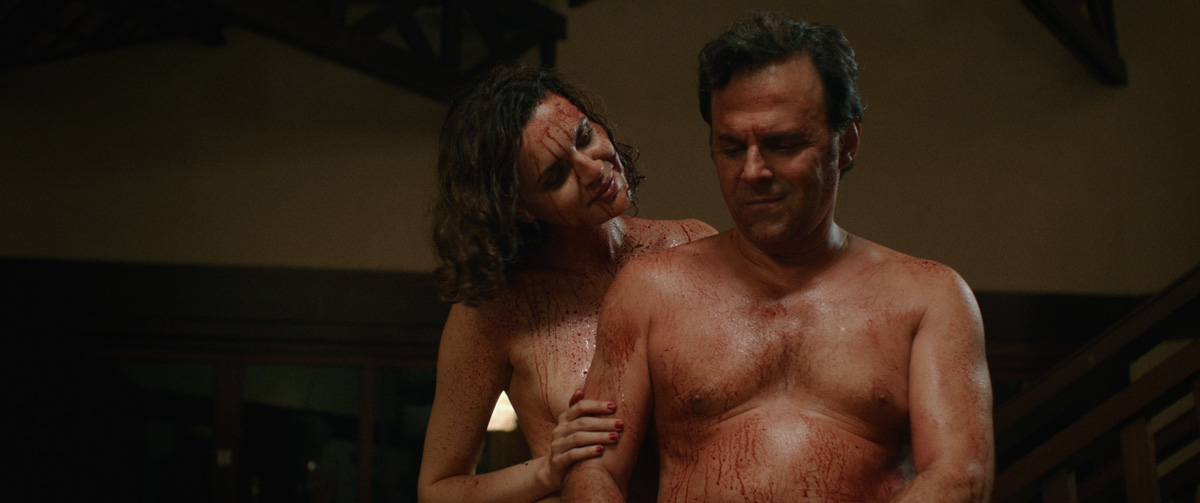
“Life is a dream for Octavio and Gilda. Residing on Brazil scenic waterfront coast, the rich-as-all-hell couple spends their non-work hours sipping fancy drinks, basking in the sun, and eating the finest of meats. The only problem? That’s human meat, pulled from the bodies of young, financially strapped victims that Gilda lures into their home. They’re part of a secret society of wealthy flesh-eaters, all of whom answer to a charismatic yet dangerous leader. And when Gilda starts getting cold feet about eating, well, cooked limbs, she and Octavio’s marriage, as well as their lives, are put in jeopardy.”
It seems as though Uncork’d Entertainment is upping their game as of late. The films the foreign acquisitions company — best known for low-budget independent fare — has been releasing this year are artful, intriguing, and well-made. First, there was Michael Matthews’ South African spaghetti Western, Five Fingers for Marseilles, and now we have Guto Parente’s Brazilian high society cannibal flick, Cannibal Club, which made its North American premiere at the Brooklyn Horror Film Festival.
Now, to be fair, Cannibal Club is in no way subtle. The rich eating the poor, literally? A portentous statement of “I’ll take this to my grave”? A character watching a nature documentary about lions with the line, “they send a warning: ‘keep out, or face an attack'”? It might all be too very much, were it not for the fact that this is a tightly-plotted, sumptuous feast for the eyes.

The story doesn’t delve into complicated subplots or make detours into the backstories as to why these characters do what they do. It’s all very up front and in the open; as the head of the Club states, they do this because they’re better. Even Octavio states at one point in regards to a plot to kill a club member that they’re not murderers, even though we see him attack his pool boy with an axe not five minutes into the film.
Cannibal Club is a movie with a simple job, which is to give us wealthy people being horrible, then getting their comeuppance. It does so admirably, with plenty of blood and sex — frequently together, resulting in a soundtrack of very squishy, sticky sounds which may very well cause those with misophonia to fly into a rage.
Fernando Catatau’s score works in an intriguing place where synth meets surf, resulting in an exotica that takes equally from nasty ’80s movies and ’60s tropicália. It really centers Cannibal Club‘s sense of place, as well as letting you know right from the beginning what to expect. When you hear noir-ish guitar over the sight of a beautiful woman exchanging sideways glances with the pool boy, there’s a certain series of events you expect to occur next.
This isn’t to say that Cannibal Club is predictable. It has some twists and turns which are unexpected, and a home invasion late in the film is one of the most taut scenes I’ve viewed in ages. The use of mirrors, darkness, and ambient sound renders it an edge-of-the-seat experience, and the payoff is excellent.

The performances from Tavinho Teixeira as Octavio, Ana Luiza Rios as Gilda, and Pedro Domingues as Club head Borges are all stellar, with moments from the couple alternating between carefully guarded and touchingly close. Domingues is chilling as a powerful man with a secret. The majority of the rest of the cast is fine, but they’re essentially there as window dressing for the three main leads, and don’t detract at all.
Cannibal Club is gorgeous, nasty, and fun and I kind of can’t wait to take another look at it. Watching it alone in my office was enjoyable, but I definitely need some friends to get grossed out with me.





1 Comment
Comments are closed.